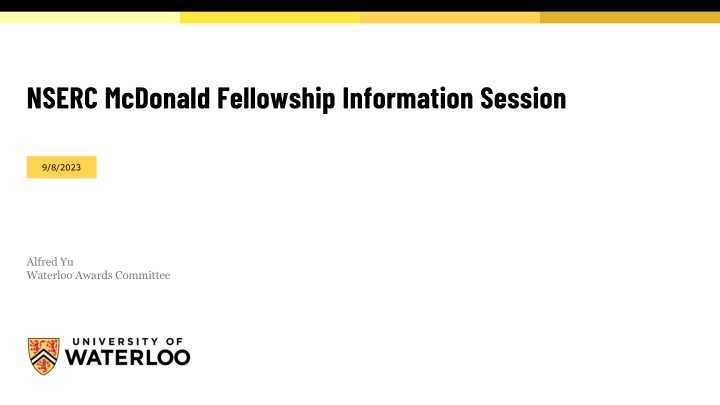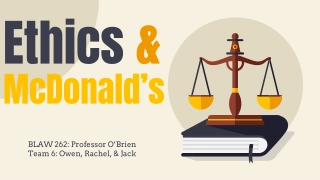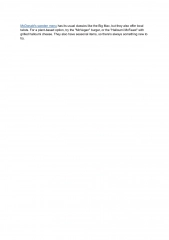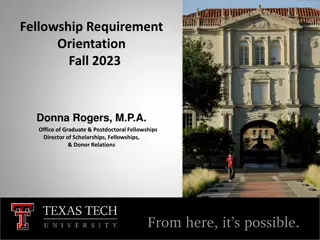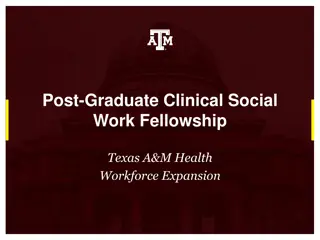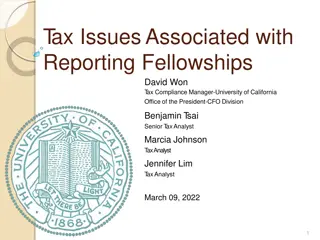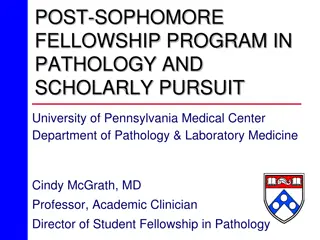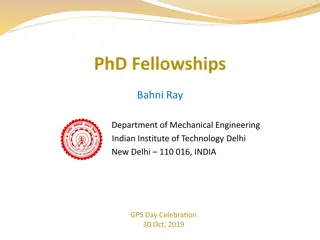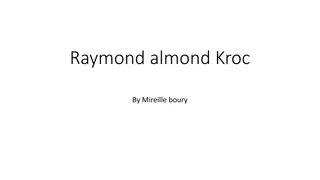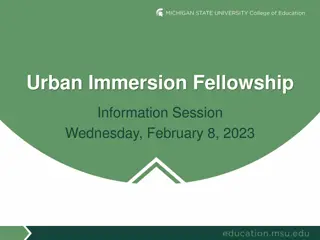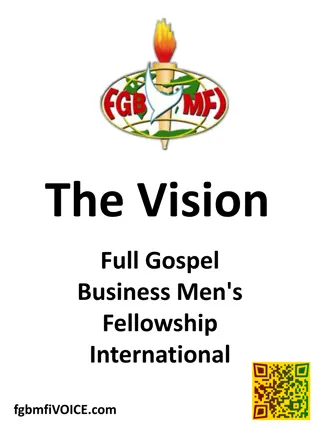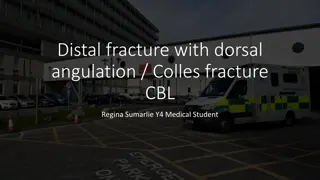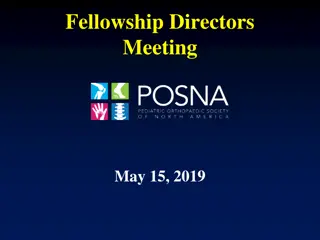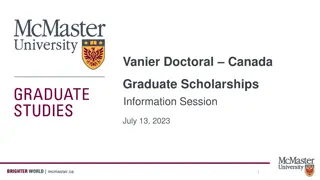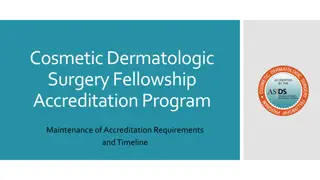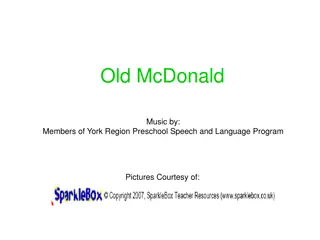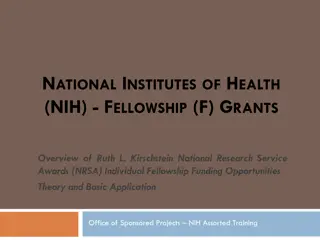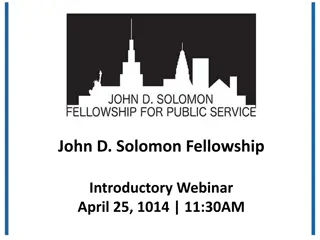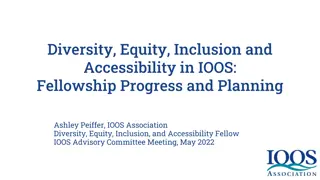NSERC McDonald Fellowship Information Session Overview
The NSERC McDonald Fellowship Information Session provides insights into the prestigious fellowship aiming to support early-stage academic researchers in natural sciences and engineering. The session includes discussions on the fellowship's background, eligibility criteria, self-nomination process, key dates for the current round, and more. Attendees will gain a comprehensive understanding of the fellowship and the opportunities it presents for aspiring researchers.
Download Presentation

Please find below an Image/Link to download the presentation.
The content on the website is provided AS IS for your information and personal use only. It may not be sold, licensed, or shared on other websites without obtaining consent from the author.If you encounter any issues during the download, it is possible that the publisher has removed the file from their server.
You are allowed to download the files provided on this website for personal or commercial use, subject to the condition that they are used lawfully. All files are the property of their respective owners.
The content on the website is provided AS IS for your information and personal use only. It may not be sold, licensed, or shared on other websites without obtaining consent from the author.
E N D
Presentation Transcript
NSERC McDonald Fellowship Information Session 9/8/2023 Alfred Yu Waterloo Awards Committee
Meeting Agenda 1) Opening Remarks by Waterloo Awards Committee Co-Chairs 2) General Information About McDonald Fellowship 3) Dialogue with Prof. Aiping Yu 2020 NSERC Steacie Fellow 4) Overview of UW Internal Review Protocol 2
Arthur B. McDonald Fellowship: General Overview Recipient of Nobel Prize in Physics (2015) for the discovery of neutrino oscillations, which shows that neutrinos have mass Professor Emeritus, Queen s University Recognizes early-stage academic researchers in the natural sciences and engineering and support them to enhance their research capacity, so that they can become leaders in their field and inspire others. NSERC awards up to six McDonald Fellowships each year Award package: 1) $250,000 research grant; 2) full teaching & internal service release for two years Previously called the E.W.R. Steacie Memorial Fellowship (1965-2021) PAGE 4
Self-Nomination Process: Eligibility and Requirements Eligibility criteria: 1) Holds NSERC grant(s) in PI capacity, 2) Within 10 years of the first independent appointment (on or after June 1, 2013 for the current round) Eligibility period can be extended if there were career delays (e.g., 1-month delay 2-month extension) NSERC s definition of independent academic position: University faculty appointment (including adjunct and non-tenured) 1) Doing research not under the direction of another individual 2) Authorized to supervise / co-supervise research students (including undergrads) and postdoctoral fellows 3) Only self-nominations are accepted. The dossier comprises these components: 6-page self-nomination letter (3 pages for candidate statement + 3 pages for future directions ) NSERC Form 100 (i.e., the NSERC applicant CV for Alliance Grant applications; not the CCV) Other forms such as Form 101, suggested referees, etc. PAGE 5
Key Dates for the Current Round Internal application deadline: October 16, 2023 Internal adjudication needed: Each institution may only submit 6 self-nominations to NSERC Sponsoring institution is required to certify a candidate s eligibility All received nominations will be engaged in an in-depth internal review process founded on the three evaluation criteria set forth by NSERC Internal review results will be announced in mid-November External application deadline: December 14, 2023 Applicable to the six UW-selected candidates PAGE 6
NSERCs Evaluation Process NSERC determines the winners via a two-stage selection process Stage 1: Peer review assessment on three criteria: 1) Research Achievements and Impact (40%), 2) Outreach, Mentorship and Leadership (30%), 3) Future Directions (30%) Stage 2: Committee discussion and ranking of applicants based on the external review reports Success rate: <5% 6 winners are selected from >100 applicants in the national competition U15 institutions typically use their full quota of 6, plus there are other applicants from smaller universities PAGE 7
Dialogue with Prof. Aiping Yu NSERC Steacie Fellow (2020) University Research Chair Professor of Chemical Engineering
Guiding Questions for Discussion 1) How has the Steacie Memorial Fellowship helped to accelerate your research program and your career development? 2) Why should we still consider applying for the McDonald Fellowship even though the success rate is not high? 3) How to best demonstrate one s achievement and impact in a self-nomination dossier? 4) What other advice do you have for prospective applicants? PAGE 10
2023/24 Internal Adjudication at UW: The Key Elements Adherence to NSERC evaluation criteria Reviewers will each provide a written report on a candidate s strengths and weaknesses in 1) Research Achievements and Impact (40%), 2) Outreach, Mentorship and Leadership (30%), 3) Future Directions (30%) Standard-based evaluation Reviewers will not be asked to rank applicants (since it is a norm-based evaluation method) Reviewers will give an initial rating to each criterion (for the purpose of setting discussion order) All eligible applications will receive full review (written feedback + committee discussion) Mitigation of reviewer bias Inappropriate use of bibliometrics will be discouraged: Impact does not refer to quantitative indicators such as the impact factor of journals or h-index Every committee member must complete UW s EDI training module PAGE 11
2023/24 Internal Adjudication at UW: The Key Elements Conflict of interest management Any of the following non-arm's length relationships constitute a perceived conflict of interest: Past supervisors, past students, past labmates, and/or relatives Co-authors of publications and/or co-applicants of funded grants in the past 5 years Co-supervisors of graduate students in the past 5 years Colleagues from the same department (not considering cross-appointments) Colleagues who used to be affiliated with the same department in the past 5 years (whether at UW or elsewhere) Committee members in conflict will not review or have access to the application in question, and they will be placed in the lobby before the discussion on that candidate begins PAGE 12
Stage 1 Reviewer Assignment Reviewer Assignment Written Assessment Committee Meeting Score Decision Notification Compilation Each application will be assigned to 3 reviewers No fewer than 1, but no more than 2 reviewers will be from the applicant s home faculty Conflict of interest relationships will be declared before reviewer assignment takes place An online pre-meeting will be organized with the committee members Purposes: 1) To inform reviewers of the internal adjudication protocol, 2) To go over the evaluation criteria to be used PAGE 13
Stage 2 Written Assessment Reviewer Assignment Written Assessment Committee Meeting Score Decision Notification Compilation Each reviewer will provide written comments to an assigned application Critique will focus on evaluating a candidate s strengths and weaknesses in each of the three NSERC evaluation criteria (1. Research Achievements and Impact; 2. Outreach, Mentorship and Leadership; 3. Future Directions) Reviewers will give a preliminary rating to each evaluation criterion Ratings will correspond to descriptors (no explicit numerical scoring) Example: Rating descriptors for the Research Achievement and Impact criterion 1) Inadequate (Premature), 2) Emerging (Good Potential), 3) Strong (Demonstrated Achievements), 4) Excellent (Convincing Evidence of Impact), 5) Outstanding (Likely Best in the Field) PAGE 14
Stage 3 Committee Meeting Reviewer Assignment Written Assessment Committee Meeting Score Decision Notification Compilation Before the committee meeting, award officer compiles the average preliminary rating for all applicants to determine discussion order Preliminary ratings and algorithm for discussion order will not be disclosed to the committee (to mitigate reviewer bias) Each application will be given 15 minutes for discussion 10-minute summary discussion by the three reviewers 5-minute open discussion by the committee (members not in conflict will have access to the application) Co-Chairs will take meeting notes to summarize the discussion PAGE 15
Stage 3 Committee Meeting Reviewer Assignment Written Assessment Committee Meeting Score Decision Notification Compilation At the end of discussion: Reviewers 1, 2, and 3 each give an overall merit rating to provide a voting rating range Other committee members vote confidentially within the rating range Out-of-range voting is only allowed if it is disclosed to the committee at the time of voting Co-Chairs also vote for the record, but the vote is not counted unless tiebreaker is needed Committee members send all scores to the Award Officer at the end of all evaluations PAGE 16
Stage 4 Score Compilation Reviewer Assignment Written Assessment Committee Meeting Score Decision Notification Compilation Award officer compiles all scores and generate a ranked list The top-6 candidates are selected for the national competition In the case of a tie, the following tiebreaking rules will be applied First tiebreaker: Priority is given to an applicant from an FDG group Second tiebreaker: Preference is given to an applicant from an underrepresented faculty Third tiebreaker: Preference is given to an applicant who is in their final year of eligibility Forth tiebreaker: Preference is given based on the Co-Chairs vote PAGE 17
Stage 5 Decision Notification Reviewer Assignment Written Assessment Committee Meeting Score Decision Notification Compilation Award officer will inform applicants of the internal adjudication decision Verbatim feedback from the 3 reviewers will be released to the applicants Summary notes on the committee s discussion will also be provided PAGE 18
